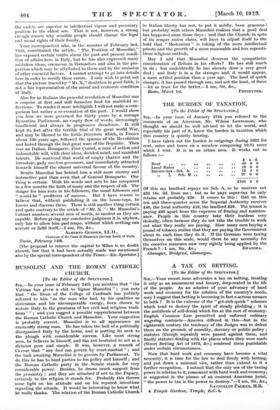MUSSOLINI AND THE ROMAN CATHOLIC CHURCH.
[To the Editor of the SPECTATOR.] SIR,—In your issue of February 24th you mention that "the Vatican has given a chit to Signor Mussolini " ; you note that "the Dean of the College of Cardinals has publicly referred to him 'as the man who had, by his qualities as statesman and his unconquerable energy, been chosen to restore Italy to the greatness of her civil and religious tradi- tions ' " ; and you suggest a possible rapprochement between the Roman Catholic Church and Mussolini. Your suggestion is probably correct. Mussolini is to all appearance an eminently strong man. He has taken the bull of a politically disorganized Italy by the horns, and is putting its neck to the plough with considerable success. Like most strong men, he believes in himself, and has not hesitated to act as a dictator pure and simple. It was, however, a remark of C,avour that "any fool can govern by court-martial " ; and the task awaiting Mussolini is to govern by Parliament. To do this he has to bind parties to his policy and himself ; and the Roman Catholic party in the Senate stands for very considerable power. Besides, he draws much support from the peasantry ; and they are attached if not to the Papacy, certainly to the religion it stands for. Probably this throws some light on his attitude and on his reputed intentions regarding the schools. It would be interesting to know what ix really thinks. The relation of the Roman Catholic Church
to Italian liberty has not, to put it mildly, been generous ; but probably with others Mussolini realizes that a good deal has happened since those days ; and that the Church, in spite of its semper eadem claim, will have to adjust itself to the hold that " Modernism " is taking of the more intellectual priests and the growth of a more reasonable and less supersti- tious religious outlook.
May I add that Mussolini deserves the sympathetic consideration of Britain in his efforts? He has still much to do ; but undoubtedly he has already done a very great deal ; and Italy is in a far stronger and, it would appear, a more settled position than a year ago. The land of quick changes, it has passed through one, and not the least, of these —let us trust for the better.—I tun, Sir, &c.,










































 Previous page
Previous page